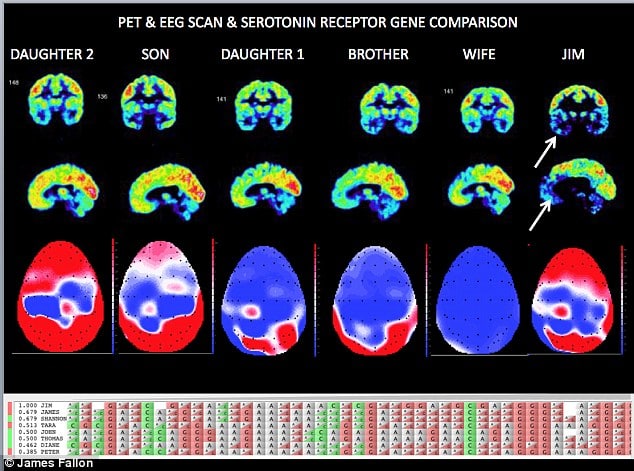
Neuroscientist and University of California at Irvine professor James Fallon came to an uncanny discovery back in 2005 after coming to study brain scans of people suffering severe psychiatric disorders.
At the time whilst studying the brain images of serial killers he also happened to come across one particular brain scan that obviously portended towards the pathological. Curious to find out whose brain scan the image belonged to he came to find out that in fact it was his own.
Unwittingly James Fallon had come to discover he too was a psychopath.
Went on totell James Fallon via the smithsonian: “I was looking at many scans, scans of murderers mixed in with schizophrenics, depressives and other, normal brains,”
“Out of serendipity, I was also doing a study on Alzheimer’s and as part of that, had brain scans from me and everyone in my family right on my desk.”
“I got to the bottom of the stack, and saw this scan that was obviously pathological,” he says, noting that it showed low activity in certain areas of the frontal and temporal lobes linked to empathy, morality and self-control.
By this stage, the then 50 years old Fallon had envisaged himself to be a well adjusted middle aged man with a distinguished career in academia and a loving family.
Fallon had been raised by supportive parents, married his high school sweetheart, Diane and had three children.
But that day, upon learning the shocking truth about himself, Fallon would go on to a quest where he would question his own identity.
Rather than hiding the unsettling discovery, James Fallon went public with it, delivering a TED talk on the subject and sitting down to a lengthy interview with NPR.
The neuroscientist has since penned a new book called The Psychopath Inside, in which he seeks to explain how a happily married father of three could also be a psychopath with the same genetic features that mass murders have been known to possess.
Reflected Fallon: ‘I’ve never killed anybody, or raped anyone,’
‘So the first thing I thought was that maybe my hypothesis was wrong, and that these brain areas are not reflective of psychopathy or murderous behavior.’

At the time James Fallon underwent a battery of genetic tests, which showed that he had an innate predisposition for aggression, violence and low empathy.
What set Fallon apart from a Charles Manson or a Ted Bundy type, however, is that while he has difficulty feeling empathy for others, Fallon does not act on his aggressive tendencies.
In retrospect, the revelation that Fallon had a lot in common with homicidal maniacs did not come as a complete surprise: the 58-year-old professor happens to be a distant relative of at least seven alleged murderers.
The scientist is related to Thomas Cornell, who was hanged in 1673 for slaying his mother in the first case of matricide in the colonies, UC Irvine’s online magazine, ZotZine, reported.
Fallon’s other infamous kin is Lizzie Borden, who was put on trial but acquitted in the grisly hatchet murders of her father and stepmother in 1892.
Research has yet to define what exactly makes a person a psychopath. In fact, psychopathy has such a wide variety of symptoms that it does not even appear in the Diagnostic and Statistical Manual of Mental Disorders.
Fallon believes that thanks in large part to his upbringing and support from his extended family, he has been able to channel and tamp down his innate psychopathic leanings.
‘I’m obnoxiously competitive. I won’t let my grandchildren win games. I’m kind of an a**hole, and I do jerky things that piss people off,’ he admitted. ‘But while I’m aggressive, but my aggression is sublimated. I’d rather beat someone in an argument than beat them up.’
According to Fallon’s theory, his ability not to act on his psychopathy is rooted in the unconditional love that his parents had given him.
James Fallon explained that his mother had had several miscarriages before finally welcoming him into the world, so to his parents he was a golden boy who was dotted upon.
‘I had a charmed childhood; I was never abused. No one’s done anything bad enough to turn me into a killer,’
‘It shows that your genes are not a jail sentence.’
Around the time puberty hit, Fallon’s parents noticed that he was starting to show some unsettling traits, and so the family rallied around him, he told NPR, steering the troubled adolescent away from a potentially perilous path.
In the wake of the stunting revelation about his genetic makeup, Fallon has been consciously altering his behavior and making efforts to think about other people’s feelings – something that does not come naturally to him.And
And then there was this comment on the web that made me wonder as well:
The inability to feel empathy doesn’t make you a psychopath, it makes you a sociopath. What makes a sociopath a psychopath is child abuse and neglect.
A human brain is programable, that’s why we go to school for 20+ years. If you program it with positive reinforcement, toward ‘ethical’ behaviors, then a sociopath simply becomes a very rational and usually successful person. If you use negative reinforcement, such as abuse or neglect, then the sociopath, lacking any instinct for empathy, learns to defend and compete for survival.
Ruthlessness, risk taking, and a lack of emotional connection can create excellent competitors, especially in refined fields like Science or Finance. Using that success for ethical ends is a choice, but free-will requires the ability to reflect upon oneself and the universe, and those who are not properly nurtured never get the guidance to understand these deeper levels of existence. That ‘parenting’ is necessary to shortcut the longer path to ethical behavior, experience = wisdom.
Those who are instinctively kind and empathic may find it difficult to grasp the rational justifications for social justice, personal liberty, and the value of enlightenment, because they FEEL these profound connections passionately, irrationally, and so don’t realize the underlying logic of their needs.
A criminal psychopath can have an inferior I.Q. and be unable to adapt to social norms, but the brains and genes of sociopaths could not exist unless there were evolutionary benefits to them. So, I conclude that there is more than one way to discover ethical behavior: through empathic feelings and through rational thinking. Both are available to most Human Animals, but for some only one path, or the other, exists.








Comments are closed.